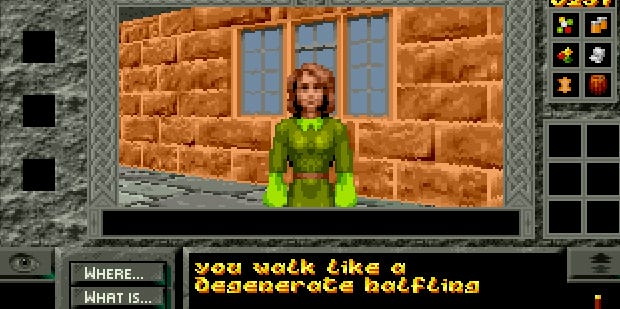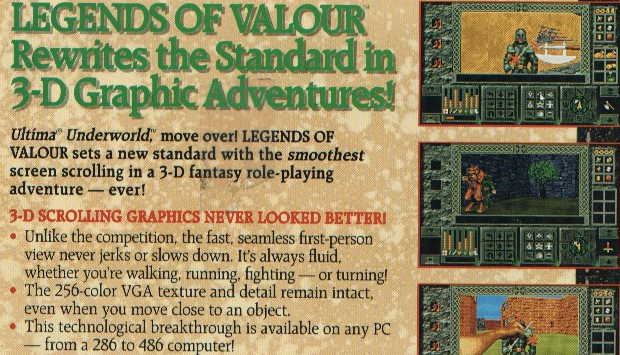The RPG Scrollbars: Legends Of Valour
Noble footmen, heroic butlers?
Who said epic action and high adventure has to be part of an adventurer's life? (Checks) Oh, right. Pretty much everyone at least expects it. Still, back in 1992, US Gold and Synthetic Dimensions decided to try something a little different. Specifically, spelling 'Valour' correctly. (The sequel might have done the same for 'Honour', but we never got to find out.) Also, something to do with life simulation. It's a little remembered game these days, but one that had a major impact on some of the biggest modern RPGs around. Ever heard of a series called The Elder Scrolls? Bethesda's Todd Howard has long mentioned this being one of its big inspirations.
My main memory of Legends of Valour aren't really of the game, but of the hilariously over the top marketing. "(The developers) were literally jostled off their feet as writers, retailers and fellow programmers sought to experience what one prominent industry figure called "A game that's more a way of life - utterly extraordinary!" "It was the journalists themselves that could be found singing the praises!" My absolute favourite part though? "Demo disks can only scratch the surface, screenshots in magazines could never do the astounding graphics justice (that's why you'll see none here)."
Not to, y'know, knock Legends of Valour, but I remember playing a demo on a magazine coverdisk, and I'm not sure 'astounding' are the words I'd have used for its incredibly primitive raycaster graphics. Ultima Underworld 2, released the same year? Now we're talking, and more convincingly than Legends of Valour's own box declaring "Ultima Underworld, move over!" on the grounds that... no kidding... it had "the smoothest screen scrolling in a 3-D fantasy role-playing adventure - ever!" It even doubled up that claim: "The hottest, smoothest 3D scrolling ever seen in an underworld, or any world!" Good grief. At this point you may as well just go the full Barnum and declare "Embark on 45 exciting quests that may cure cancer!" "VGA graphics blessed by God!" "Actually a window into a parallel universe with dragons and shit!"
Anyway, I digress. My main memory of the game was the demo, which I played for a surprisingly long time given its almost complete lack of actual content. You had a good chunk of the city to play in, and being able to go in and out of buildings and chat to random people was pretty cool for the time. Mostly what I remember though was that for some reason, combat was disabled. Early on though I realised that if you threw things at people then it damaged them, and spent many happy hours doing just that, as well as somehow stumbling into a dungeon layer of the game that I wasn't meant to be in - the clue being the crazy nightmare wall textures that no artist would ever have signed off on. With the possible exception of the artists working on The Catacomb Abyss, of course, where all the worst fantasy textures have long been trapped.
It was many years later that I finally played the full game. (Sadly, in the time between reviewers jostling the creators off their feet and actually reviewing it, they'd mostly decided that it sucked). Not too shockingly, time hasn't been kind to its graphics or its world simulation or its dialogue or its... honestly, at this point it would be more surprising if it did hold up well. I'm not going to slam it for that though, because even now, with this shiny new copy totally bought on eBay, honest, it's an interesting peek at a different way of doing things that was only really picked up again very occasionally - games like Robinson's Requiem and its sequel Deus springing to mind.
I was mostly drawn to it now because for the last few weeks, I've talked about games conveying a sense of heroism and power, and there's been quite a few rumblings about how old that gets. Legends of Valour is one of the defining examples of the other approach. You're a nobody, with no great destiny and no particular skills, in a world marked by its absolute indifference to you. Much of the challenge early on is simply surviving hunger and thirst and the town guards' love of arresting people rather than fighting the monsters that live below, as well as learning your way around a town whose map is a sprawling urban nightmare. There was a map and you can at least ask for directions, but an engine of this vintage isn't what you want to reach for when it comes to radically different city districts and cool points of interest. You spend at least much, if not all your time basically starving to death on the street in the rags of what few bits and pieces bought back in your home town. Now, on top of that, there's a story, there's quests, there's guilds to join and all the usual RPG stuff, but there's reasons why nobody ever talks about that side of the game. It's pretty weak.
Within the weakness though, there's still some wonderful weirdness. The ability to hurl insults at everyone, like "Didn't you used to be a bugridden cave dwarf?" that tend to turn into stabby face pain if pulled on the wrong person. Local delicacies including the bugburger - literally, a tarantula in a bun with lettuce - and zombie brains ("Very appetising if you've a mind!") that bring a whole new horror to filling up need bars. Gambling on cockroach races at the tavern for cash. Hilarious digitised photos in the various town establishments, with the option to send in a photo and have your own integrated into the game, a la Core Design's Corporation. Bumping into werewolves wandering around at night, calling them over with a "Hey?" and then asking them for directions. Not much use unless what you were looking for actually was over in the "GRRRRRRRRRRR!" District, but hey, at least you could talk to the monsters!
And, for the time, this was all inspiring stuff. As crappy as Legends of Valour looked next to Ultima Underworld, this was an era where the simple idea of one day playing an Ultima Overworld was the stuff of impossible dreams. (Then when we more or less got it, it was Ultima IX. Aargh!) While I have no particular fondness for the full game, the demo at least was a glimpse of RPGs as we know them now - a genre that can go anywhere and do anything and not be limited by the needs of smacking monsters for gold and XP. It wasn't the only one by any stretch, but this was an era where PC games were incredibly expensive and information was often very thin on the ground.
Certainly, very few were lucky enough to have the fluency that even casual onlookers can now enjoy as a matter of course, never mind the in-depth knowledge of what individual titles were doing beyond the basic sell and maybe a few hundred words if you were lucky. (In the US, there were regulars like Scorpia who covered that kind of thing, but I don't remember any equivalents in the UK.) That was certainly never the case for games that died on the shelves, as Legends of Valour did, putting paid to the idea of any sequels that might have built on its life/RPG hybrid idea with better tech.
Still, look out at the family tree, and at least in a way its successors over in The Elder Scrolls universe are now some of the most successful RPGs in the world, and survival mods amongst their most popular additions. There are worse fates for an flawed but innovative game to enjoy, even if its own name has long faded from history.





